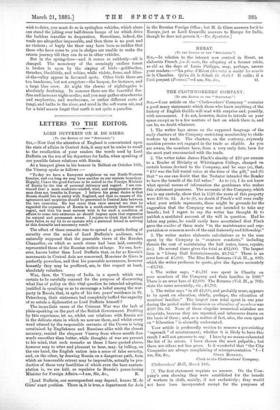LETTERS TO THE EDITOR.
LORD DIIFFERIN ON M. DE GIERS.
LTO THE EDITOR Or TEE " SPECTATOR." J
&n,—Now that the attention of England is concentrated upon the state of affairs in Central Asia, it may not be amiss to recall to the recollection of your readers the words used by Lord Dafferin on the eve of his departure for India, when speaking of our possible future relations with Russia.
At a banquet given in his honour in Belfast on October 16th, the Viceroy spoke as follows :—
"To-day we have a European neighbour on our North-Western frontier, and ere long we may have another on our eastern boundary. Happily, I have the good-fortune to be united to the Foreign Minister of Russia by the ties of personal intimacy and regard. I am convinced that a more moderate-minded, wise, and unaggressive statesman does not breathe in Europe. I believe his great desire is that Russia should live in amity with England, and that no causes of disagreement and suspicion should be generated in Central Asia between the two countries. He has more than once assured me that he vegarded the expansion of Russia in a south-easterly direction with regret, and that his most earnest wish is for such a condition of affairs to come into existence as should impose upon that expansion its natural and permanent arrest. I rejoice to think that it should have fallen to my lot to cooperate with a personal friend in arriving at this desirable and necessary result."
The effect of these remarks was to spread a gentle feeling of security over the mind of Lord Dufferin's audience, who naturally supposed that the peaceable views of the Russian Chancellor, on which so much stress had been laid, correctly
represented those of the Russian nation at large. No one, however, knows better than Lord Dnfferin that, so far as Russia's movements in Central Asia are concerned, Monsieur de Giers is -perfectly powerless, and that his peaceable assurances, however
honestly they may be proffered, are, in this respect at least, -absolutely valueless.
Was, then, the Viceroy of India, in a speech which was -certain to be carefully scanned for the purpose of discovering what line of policy on this vital question he intended adopting, justified in speaking so as to encourage a belief among the warparty in Russia that, in spite of his two years' residence in St. Petersburg, their statesmen had completely baffled the sagacity of so astute a diplomatist as Lord Dnfferin himself ?
The immediate cause of the Crimean War was the lack of plain-speaking on the part of the British Government. Profiting by this experience, let us, whilst our relations with Russia are in the delicate state in which we now see them, and whilst every word uttered by the responsible servants of the Crown is being scrutinised by Englishmen and Russians alike with the closest accuracy, remind the eloquent Viceroy from whose mouth flow words smoother than butter, while thoughts of war are present to his mind, that such remarks as those I have quoted above, however easy to utter and pleasant to hear, may, by lulling, on the one hand, the English nation into a sense of false security, and, on the other, by drawing Russia on a dangerous path, from which an honourable retreat may be impossible, actually be pro ductive of those very hostilities of which even the bare contemplation is, we are told, so repulsive to Russia's peace-loving Minister for Foreign Affairs.—I am, Sir, dm, R.
[Lord Dufferin, our correspondent may depend, knows M. de Criers' exact position. There is, it is trite, a department for Asia in the Russian Foreign Office ; but M. de Giers answers for it to Europe, just as Lord Granville answers to Europe for India, though he does not govern it.—En. Spectator.]


































 Previous page
Previous page